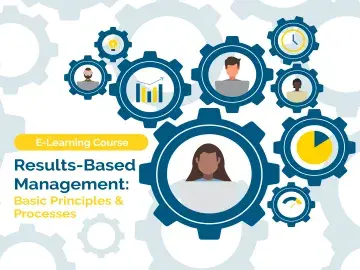Results-Based Management: Basic Principles & Processes
This is an introductory course on results-based management (RBM) principles and processes for effective programme monitoring and implementation. The consistent application of RBM is critical to achieve desired results and reports or communicate these results regularly to stakeholders and the wider public.
If applied properly, these principles and practices can strengthen one’s ability to contribute to measurable positive change. Although RBM and implementation monitoring is fundamentally a programme/project-level activity, it requires clear strategic direction as well as effective collaboration with partners and stakeholders at different levels.
To provide basic knowledge and skills of the key concepts in RBM and its relationship to results-based monitoring and evaluation to track results, performance and learning. The purpose is to promote a harmonized approach to M&E and to provide a common framework for measuring and communicating programme outcomes. At the end of this course, you will be able to:
- Describe what RBM is, how it adds value to programming, and how it helps to achieve intended results.
- Define essential RBM concepts and terminology;
- Develop, implement, and monitor a results framework using RBM principles;
- Generate more relevant reports that demonstrate the results and learning from implementing a programme or project.
RBM, developed and refined through years of practitioner experience and applied research, is used to examine the component parts of RBM, especially Theory of Change, strategic results framework, risks and assumptions as part of integrated monitoring and evaluation as well as the use of evidence from monitoring and evaluation in decision-making and meaningful reporting to key stakeholders. The connections between the parts are mapped, and key features of a results culture identified, to show how the system should work as a unified whole. It is an extension of the M&E Policy Framework of the Centre and helps to apply it in practice. Trainees are expected to use the module to identify strengths, weaknesses and gaps in their own approach to RBM systems and cultures.
This course is composed of five parts:
- Part I: Introduction to RBM
- Part II: Setting a Results Based Strategy
- Part III: Theory of Change and Results Mapping
- Part IV: Planning, Monitoring and Reporting Instruments
- Part V: Results Matrix
This course is composed of a single interactive module that includes various examples and activities. It can be taken as a stand-alone course and is also a prerequisite to a face-to-face RBM training for the Centre’s staff.
It will take you about 2 hours to complete this self-paced course.
This course is recommended for all KAICIID staff, and it is mandatory for the Programme Department’s professional staff. This RBM course is also open to KAICIID partners.
Modern and updated browsers.
KAICIID's E-Learning Programme includes digital knowledge tools, e-learning courses and thematic webinars, which teach dialogue as a tool to solve global issues. All e-learning courses are linked with global initiatives and development goals for sustainable peace. The courses build the capacities of global leaders to address a number of today's most pressing challenges by using interreligious dialogue to establish ethical policymaking frameworks, support peace processes, and address discrimination and religiophobia, at national and local levels. KAICIID e-learning courses are interactive, offered free of charge and are designed to benefit both dialogue professionals and the general public.
E-Learning in IRD designed for the general public


